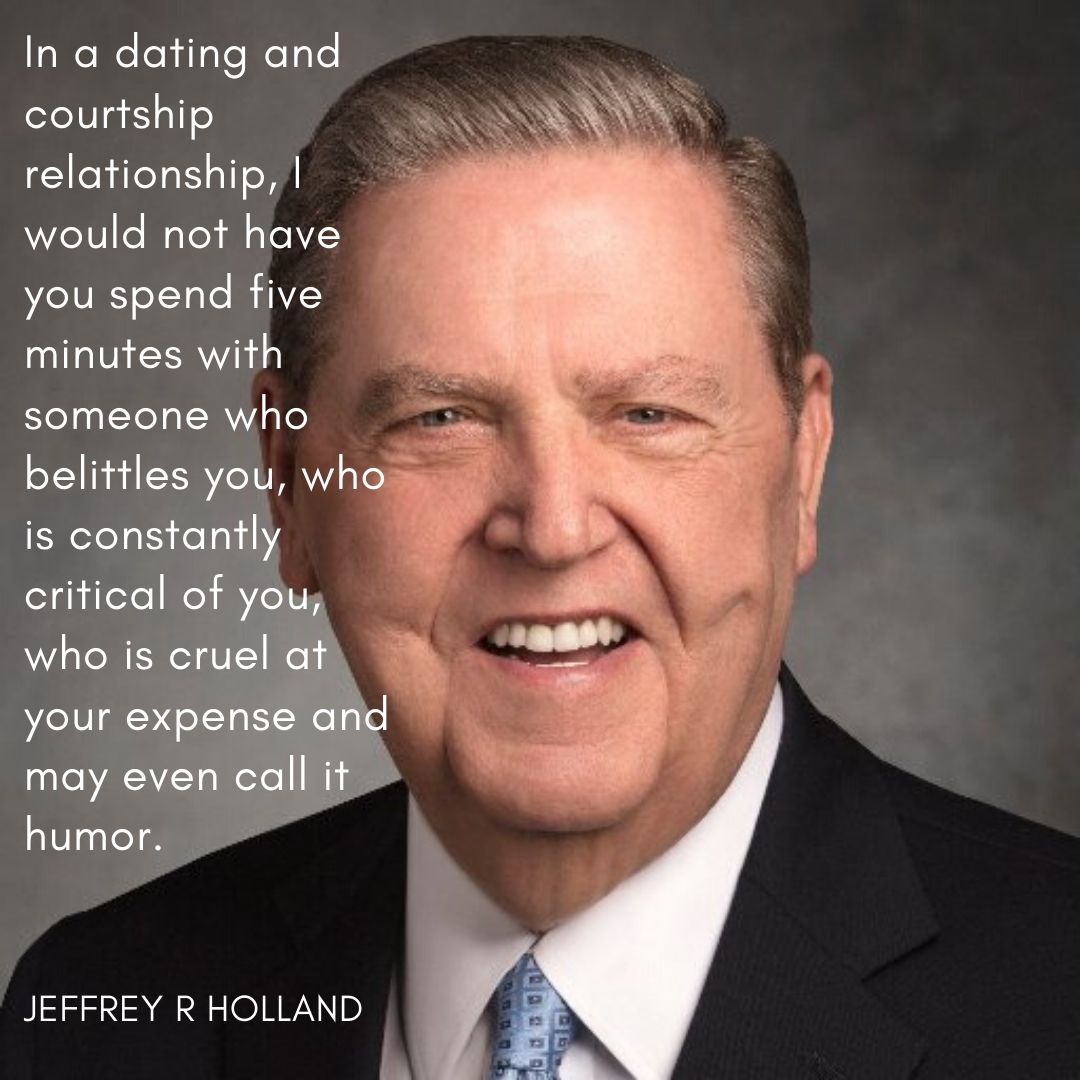We couldn’t say it any better than Elder Holland so we thought we would share some of our favourite bits of his wonderful advice in the talk below. We love that this advice is applicable to all relationships whether they be dating, family or friendships.
“How Do I Love Thee?” – Elder Jeffrey R Holland 1999
Our favourite bits:
I approach the subject knowing full well that, as a newly engaged young woman said to me just last month, “There is certainly a lot of advice out there!” … So perhaps all of you will forgive me for offering, yes, more advice. But I wish it to be scriptural advice, gospel advice. Advice, if you will, that is as basic to life as it is to love—counsel that is equally applicable to men and to women. It has nothing to do with trends or tides of the time or tricks of the trade but has everything to do with the truth.
So may I put your friendships and dates and eventually your marriages in a scriptural context this morning and speak to you of what I will try to communicate as true love.
The seventh chapter of Moroni tells us that this highest of Christian virtues is more accurately labeled “the pure love of Christ.”
And it endureth forever; and whoso is found possessed of it at the last day, it shall be well with him [and her].
True charity, the absolutely pure, perfect love of Christ, has really been known only once in this world—in the form of Christ Himself, the living Son of the living God … As in everything, Christ is the only one who got it all right, did it all perfectly, loved the way we are all to try to love. But even though we fall short, that divine standard is there for us. It is a goal toward which we are to keep reaching, keep striving—and, certainly, a goal to keep appreciating.
And as we speak of this, may I remind you, as Mormon explicitly taught, that this love, this ability, capacity, and reciprocation we all so want, is a gift. It is “bestowed”—that is Mormon’s word. It doesn’t come without effort and it doesn’t come without patience, but, like salvation itself, in the end it is a gift, given by God to the “true followers of his Son, Jesus Christ.” The solutions to life’s problems are always gospel solutions. Not only are answers found in Christ, but so is the power, the gift, the bestowal, the miracle of giving and receiving those answers. In this matter of love, no doctrine could be more encouraging to us than that.
How do I love thee?
I have taken for a title to my remarks Mrs. Browning’s wonderful line “How do I love thee?” I am not going to “count the ways” this morning, but I am impressed with her choice of adverb—not when do I love thee nor where do I love thee nor why do I love thee nor why don’t you love me, but, rather, how. How do I demonstrate it, how do I reveal my true love for you? Mrs. Browning was correct. Real love is best shown in the “how,” and it is with the how that Mormon and Paul help us the most.
The first element of divine love—pure love— is its kindness, its selfless quality, its lack of ego and vanity and consuming self-centeredness. “Charity suffereth long, and is kind, [charity] envieth not, and is not puffed up, seeketh not her own” (Moroni 7:45). I have heard President Hinckley teach publicly and privately what I suppose all leaders have said—that most problems in love and marriage ultimately start with selfishness.
A few great traits:
There are many qualities you will want to look for in a friend or a serious date—to say nothing of a spouse and eternal companion—but surely among the very first and most basic of those qualities will be those of care and sensitivity toward others, a minimum of self-centeredness that allows compassion and courtesy to be evident. “That best portion of a good man’s life [is] his … kindness,” said Mr. William Wordsworth. There are lots of limitations in all of us that we hope our sweethearts will overlook. I suppose no one is as handsome or as beautiful as he or she wishes, or as brilliant in school or as witty in speech or as wealthy as we would like, but in a world of varied talents and fortunes that we can’t always command, I think that makes even more attractive the qualities we can command—such qualities as thoughtfulness, patience, a kind word, and true delight in the accomplishment of another. These cost us nothing, and they can mean everything to the one who receives them.
I like Mormon and Paul’s language that says one who truly loves is not “puffed up.” Puffed up! Isn’t that a great image? Haven’t you ever been with someone who was so conceited, so full of themselves that they seemed like the Pillsbury Doughboy? True love blooms when we care more about another person than we care about ourselves. That is Christ’s great atoning example for us, and it ought to be more evident in the kindness we show, the respect we give, and the selflessness and courtesy we employ in our personal relationships.
In all that Christ was, He was not ever envious or inflated, never consumed with His own needs. He did not once, not ever, seek His own advantage at the expense of someone else. He delighted in the happiness of others, the happiness He could bring them. He was forever kind.
The quote we all know and love
In a dating and courtship relationship, I would not have you spend five minutes with someone who belittles you, who is constantly critical of you, who is cruel at your expense and may even call it humor. Life is tough enough without having the person who is supposed to love you leading the assault on your self-esteem, your sense of dignity, your confidence, and your joy. In this person’s care you deserve to feel physically safe and emotionally secure.
Members of the First Presidency have taught that “any form of physical or mental abuse to any woman is not worthy of any priesthood holder” and that no “man who holds the priesthood of God [should] abuse his wife in any way, [or] demean or injure or take undue advantage of [any] woman”—and that includes friends, dates, sweethearts, and fiancées, to say nothing of wives (James E. Faust, “The Highest Place of Honor,” Ensign, May 1988, 37, and Gordon B. Hinckley, “Reach Out in Love and Kindness,” Ensign, November 1982, 77).
If you are just going for pizza or to play a set of tennis, go with anyone who will provide good, clean fun. But if you are serious, or planning to be serious, please find someone who brings out the best in you and is not envious of your success. Find someone who suffers when you suffer and who finds his or her happiness in your own.
Temper tantrums are not cute even in children; they are despicable in adults, especially adults who are supposed to love each other. We are too easily provoked; we are too inclined to think that our partner meant to hurt us—meant to do us evil, so to speak; and in defensive or jealous response we too often rejoice when we see them make a mistake and find them in a fault. Let’s show some discipline on this one. Act a little more maturely. Bite your tongue if you have to. “He that is slow to anger is better than the mighty; and he that ruleth his spirit than he that taketh a city” (Proverbs 16:32). At least one difference between a tolerable marriage and a great one may be that willingness in the latter to allow some things to pass without comment, without response.
Endurance is the key
Bear up and be strong. Be hopeful and believing. Some things in life we have little or no control over. These have to be endured. These are not things anyone wants in life, but sometimes they come. And when they come, we have to bear them; we have to believe; we have to hope for an end to such sorrows and difficulty; we have to endure until things come right in the end.
One of the great purposes of true love is to help each other in these times. No one ought to have to face such trials alone. We can endure almost anything if we have someone at our side who truly loves us, who is easing the burden and lightening the load.
People have differing capacities at different times and even different days in their lives. Together we need to monitor the load levels and be helpful in shedding or at least readjusting some cargo if we see our sweetheart is sinking. Then, when the ship of love is stabilized, we can evaluate long-term what has to continue, what can be put off until another time, and what can be put off permanently. Friends, sweethearts, and spouses need to be able to monitor each other’s stress and recognize the different tides and seasons of life. We owe it to each other to declare some limits and then help jettison some things if emotional health and the strength of loving relationships are at risk. Remember, pure love “beareth all things, believeth all things, hopeth all things, endureth all things,” and helps loved ones do the same.
Final words
In Mormon’s and Paul’s final witnesses, they declare that “charity [pure love] never faileth” (Moroni 7:46, 1 Corinthians 13:8). It is there through thick and thin. It endures through sunshine and shadow, through darkest sorrow and on into the light. It never fails. So Christ loved us, and that is how He hoped we would love each other. In a final injunction to all his disciples for all time, He said, “A new commandment I give unto you, That ye love one another; as I have loved you” (John 13:34; emphasis added). Of course such Christlike staying power in romance and marriage requires more than any of us really have. It requires something more, an endowment from heaven. Remember Mormon’s promise: that such love—the love we each yearn for and cling to—is “bestowed” upon “true followers of Christ.” You want capability, safety, and security in dating and romance, in married life and eternity? Be a true disciple of Jesus. Be a genuine, committed, word-and-deed Latter-day Saint. Believe that your faith has everything to do with your romance, because it does. How should I love thee? As He does, for that way “never faileth.”
Click HERE for the full talk

